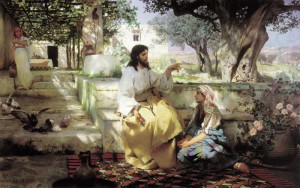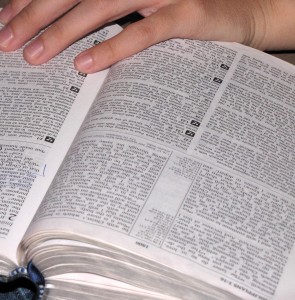It is Thanksgiving time and there is light.



They sit around the table laden with food, this family bound together by blood. There is light and laughter, talk of sports and of God, there is caring and kindness between generations. There are eyes shining bright, shining with love and with joy in the company around them.
And there is darkness.
There is one who is recently bereft of the comfort of spouse, struggling to find what is normal. There is one who sits heavy with the weight of marriage that is harder than expected. There is one who wonders if anything they do will ever seem good enough.
There is one who struggles with getting older, one who struggles with trouble at work and money that slips through the fingers, one who wonders if there is anything good coming when they can’t see what lies further down the road.

There is darkness in all of us. It is a part of being human to feel the weightiness of the absence of God. And there is an absence of God in this world. The Bible we profess speaks of it. The prophets and psalms all speak of Him who is not there when He is most needed. The author of Hebrews strips all of our pretense away when he speaks of Noah, of Abraham, of Gideon and David and the rest who “all died without having received what was promised.” It is the anguish of glimpsing the briefest glow of the light of presence without being allowed to bask in the sun.
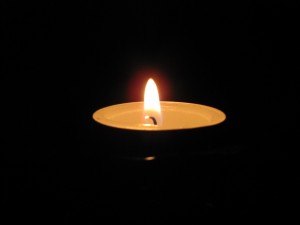
It is a terrible love, this love of God for us. It is a love that means His absence as often as it means His presence. It is a love that Jesus speaks of when He utters in His darkest moment the piercing cry of Where are you, God?
You who are in heaven for us, why are you not down here in hell with us?
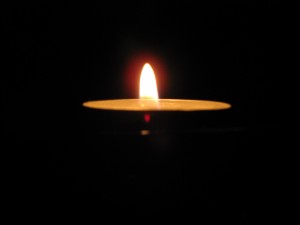
It is a terrible love that speaks of carrying our own cross, that utters the truth that all ye labor and are heavy laden.
It is a terrible love that wounds, or allows the wounds, before the healing can come.
It is a terrible love that weeps at the death of a friend, of Lazarus. They are tears that speak of the absence of God. Of the part of God in the very body of Jesus who would not save the life of His own friend.
This is, after all, the Gospel. It is terrible before it is beautiful. It is darkness before it is light.
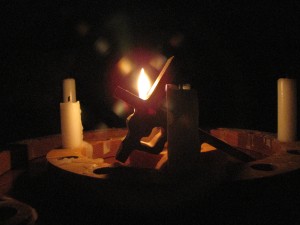
We all labor and are heavy laden. We work so very hard to pretend that it is not so, but even when we are appalled at the darkness, we cannot help but listen to Jesus because we see in Him not only the darkness of being without God but the glorious light of what it looks like to be with God.
It is out of the absence of God that He becomes most present. It is out of the whirlwind, out of the storm that God first speaks to Job, answering Him not with answers but with Himself. It is out of darkness that we first begin to perceive the light.
Paul says that “God chose what is foolish in the world to shame the wise. God chose what is weak in the world to shame the strong. God chose what is low and despised in the world, even things that are not, to bring to nothing things that are”, and he points to “the apparent emptiness of the world where God belongs and to how the emptiness starts to echo like an empty shell after a while until you can here in it the still, small voice of the sea, hear strength in weakness, victory in defeat, presence in absence.” ~ Frederick Buechner
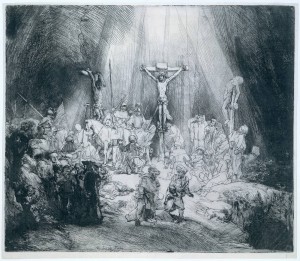
The cross itself is a symbol of defeat before it is a symbol of victory and it, too, speaks of the absence of God.
When the absence is all that we see, when we are tempted to see in it a well of doubt that could lead us into atheism or at least into becoming agnostic, there is yet something else to see as well.
It was out of the darkness and absence that God first spoke. “In the beginning…the earth was without form and void, and darkness was upon the face of the deep.” And darkness is upon our faces as well, a void that sinks deep into our hearts. And perhaps it is necessary for the reality of this darkness to fold itself around us for us to be able to glimpse the reality of the word that God spoke into the darkness, “God said let there be light, and there was light.”
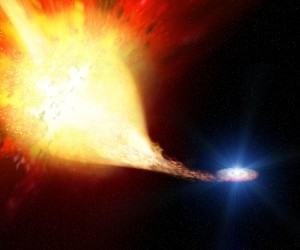
It is a terrible love that is offered to us, and perhaps we must face the truth of the terribleness before we are capable of accepting the love.
Art credits: Three Crosses sketch by Rembrandt; Supernova photo by NASA



